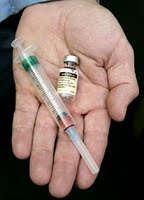Clash of the Titans for the HPV Vaccine Market

New York City, NY
wo pharmaceutical giants are vying for the billions of dollars up for grabs in the market for vaccines against the human papillomavirus, or HPV, a sexually transmitted infection that can cause cervical cancer and genital warts.
Merck, which has had a monopoly on HPV vaccines in the United States with its Gardasil for young women, has asked the Food and Drug Administration to approve the drug to protect against genital warts in young men. In 2006, the agency approved Gardasil to protect girls and women ages 9 to 26 against certain strains of the virus that can cause genital warts, pre-cancerous genital lesions and cervical cancer.
Meanwhile, GlaxoSmithKline, which currently markets its Cervarix vaccine to young women in about 100 countries, is seeking to have the vaccine approved in the United States to protect girls and women ages 10 to 25 against certain HPV strains that can cause cervical cancer. Cervarix does not offer protection against strains of the virus that can cause genital warts.
On Wednesday, an advisory panel of the Food and Drug Administration voted that research data from Glaxo had demonstrated the safety and efficacy of Cervarix to protect young women against cervical cancer. The panel, composed of outside experts, also voted in favor of the safety and efficacy of Gardasil to inhibit genital warts in boys and men ages 9 to 26.
The F.D.A. typically follows the recommendations of such panels on drug approvals.
Glaxo shares were up about half a percent to $39.22 at the end of trading on Wednesday; shares of Merck were up about 1.9 percent to $31.55.
But industry analysts said that the drug companies faced a battle to expand the target audience in America for such vaccines because the drugs have limited effectiveness and unknown duration. They also have possible side effects like dizziness and fainting.
Both vaccines also require a series of three shots over six months. Both are most protective in young people who have not yet been exposed to the virus because they are either not sexually active or have just become sexually active and have had few romantic partners.
Indeed, because of the limited audience of young women, American sales of Gardasil have recently stalled, said Tim Anderson, an analyst with Sanford C. Bernstein. In the first half of this year, Gardasil had sales in the United States of $363 million, a decrease of 34 percent compared with the same period in 2008, according to a Merck financial statement.
Mr. Anderson said that Merck will find it harder to persuade parents and health insurers to pay for Gardasil shots to reduce the chance of developing a nonfatal condition like genital warts in boys than to market the vaccine to reduce a potentially deadly disease like cervical cancer in young women.
“You are asking a healthy teen to come to the doctor three times in six months,” Mr. Anderson said in an interview Wednesday. “Pretty much no healthy teen would ever do that, let alone to come back and get a shot, a shot that can cause a lot of pain.”
In a note to investors on Friday, Mr. Anderson forecast that in 2015, Gardasil would have 65 percent of an estimated $3.7 billion worldwide market for vaccines against the human papilloma virus, with Cervarix accounting for the rest.
If the agency ultimately approves Cervarix for use in young women, Glaxo will have to distinguish the drug as a longer-lasting and more comprehensive vaccine to gain a foothold in the United States market owned by Merck, analysts said.
Since the advent in the 1950s of the Pap test to detect precancerous cells in the cervix, death rates from cervical cancer in the United States have dropped by about 70 percent, said Dr. Debbie Saslow, the director of breast and gynecological cancers at the American Cancer Society. An estimated 11,000 women in the United States will develop invasive cervical cancer this year and about 4,000 women will die from the disease, most of whom have never had a pap test, Dr. Saslow said.
The Food and Drug Administration has approved Gardasil to protect against two strains of the virus, 6 and 11, which can cause genital warts, as well as two strains, 16 and 18, which are responsible for the development of about 70 percent of cervical cancers.
Now, Glaxo has submitted data to the agency, suggesting that its vaccine also provided cross-protection against several other strains responsible in total for about 86 percent of cervical cancers, the company said.
“Cervarix will prevent more cancers and save more lives than a vaccine without cross protection,” Dr. Barbara Howe, director of North American vaccine development for Glaxo, told the F.D.A. panel on Wednesday.
But an F.D.A. expert told the panel that it was difficult to measure protection against addition strains that cause cervical cancer.
The panel also examined safety questions about whether Cervarix could increase a woman’s risk of miscarriage or of autoimmune diseases, rare problems which Glaxo said it would follow in post-marketing studies.
Merck is also hoping for approval from the F.D.A. to protect boys and young men against the strains of the virus that can cause venereal warts.
But, although the F.D.A. panelists voted that Merck had demonstrated the safety and efficacy of Gardasil for boys, skepticism among a few panelists suggested that Merck may find it difficult to persuade boys to have shots for an uncomfortable but non-life-threatening problem that often resolves itself without medical intervention.
Cervical Cancer Malpractice Attorneys
Labels: Cervarix, Cervical Cancer Prevention, Cervical Cancer. HPV, Gardasil

0 Comments:
Post a Comment
<< Home